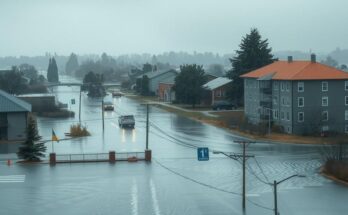Tropical Cyclone Dikeledi has impacted over 7,000 people in Madagascar, damaging thousands of homes and disrupting the education of 8,000 children. Authorities are providing humanitarian assistance while monitoring the cyclone’s intensity and expected trajectory, with heavy rains forecasted for Toliara Province. Displaced individuals have begun returning home as responses to restore normalcy are implemented.
As of January 15, 2025, reports indicate that Tropical Cyclone Dikeledi has impacted more than 7,000 individuals in Madagascar, damaging over 1,000 houses, with 203 completely destroyed. In the northern regions of Madagascar, displacement sites have been evacuated, as affected individuals have returned home. Schools resumed operations on January 13 in several areas, although approximately 8,000 children faced disruption due to damage affecting nearly 250 classrooms. The cyclone is set to cause heavy rains and strong winds in Toliara Province from January 15 to 16 as it intensifies. Humanitarian partners and the government are providing critical assistance to those affected while monitoring the cyclone’s trajectory along the coast.
Tropical Cyclone Dikeledi made landfall on January 11, 2025, in northern Madagascar, leaving 7,028 individuals affected, with regions such as Diana and Sava being the hardest hit. The cyclone has resulted in fatalities, property damage, and disruptions to education, prompting a humanitarian response. Dikeledi is expected to develop into an intense cyclone but is projected to weaken as it moves south toward subtropical latitudes, ultimately losing its tropical characteristics. The cyclone’s impact prompted coordinated efforts for emergency relief and infrastructural assessment.
Tropical Cyclone Dikeledi has adversely affected many communities in Madagascar, leading to significant property damage and casualties while causing interruptions to schooling. While the cyclone is anticipated to gain intensity and cause hazardous weather along the southwest coast, it is projected to weaken thereafter. The government’s swift response, alongside humanitarian partners, aims to provide essential resources and support to those impacted by this natural disaster.
Original Source: www.unocha.org




